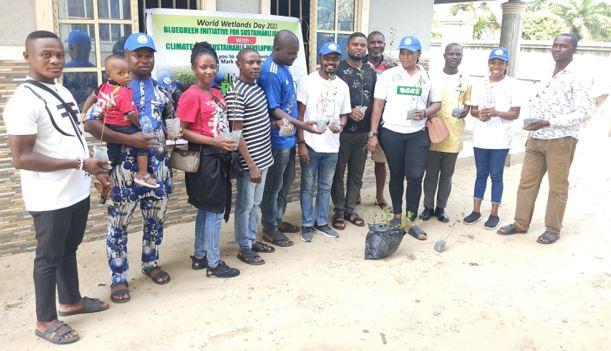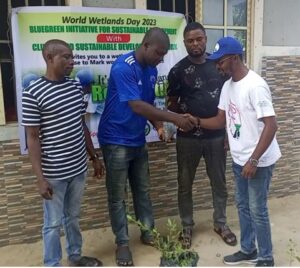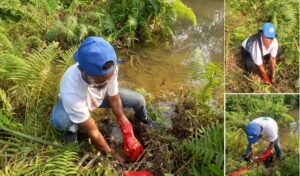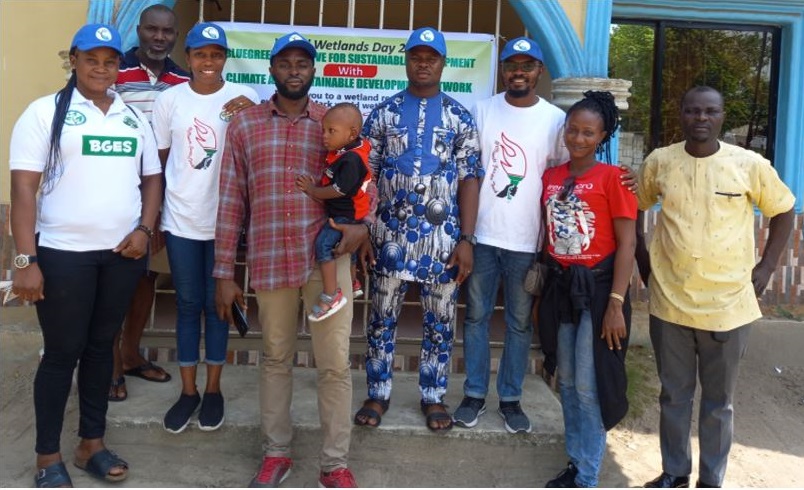
A member organisation of Climate and Sustainable Development Network (CSDevNet), the BlueGreen Initiative for Sustainable Development and other member organisations, YDAs and CRPs in the South-south region of Nigeria, embarked on a Wetland Restoration Project in Iko Town.
This was in commemoration of the 2023 World Wetlands Day which is celebrated February 2nd every year across the globe. The theme of this year’s World Wetlands Day is “It’s Time for Wetlands Restoration.”
Iko Town, a small swampy settlement in Eastern Obolo Local Government Area of Akwa Ibom State, was chosen as the outreach community because of its importance to the ecosystem and obvious significance to the economy.
Iko town is characterized by wetlands with mangrove trees and notably the Nipa palm which is an invasive species and a threat to the mangroves as they easily displace the mangroves vegetation.

However, several factors have been negatively affecting/threatening the existence of the wetlands and biodiversity of this area. They include: crude oil exploration activities, land reclamation, proliferation of invasive species (Nipa palm), and overfishing.
The project team was well received by the village head and the youth leadership who appreciated the project team for choosing their community amongst all the Wetland communities in the state to carry out the restoration project.
The village head, HRH Isaiah Akprikpe, spoke about their challenges which include the dwindling fish population due to the destruction of the fish habitat by the companies operating in the area.
He also acknowledged the fact that Nipa palm trees has displaced the indigenous mangrove species which is also impacting negatively on the fish population and on the ecosystem, generally.
With his permission and with support from the youth president and his team, fifty (50) stands of mangrove trees were donated and planted to mark the world Wetlands day. The community promised to protect the trees and care for them as they were focused on reaping maximum benefits from the trees.

They were so happy engaging in the exercise and entreated the team to return soon with more impact driven projects that would aid the restoration of their already degraded ecosystem.
As a fishing community, they made a case of how their catch had drastically dropped over the years and how that affected their means of livelihood. Even more disturbing were the activities of oil companies carrying out oil exploration in the area whom they said were posing serious threat the environment, their health, source of drinking water and other means of livelihoods.
Mr Ediongsenyene Ndunobong, the project lead, reiterated o the importance of the restoration intervention.
“Wetlands are unique ecosystems that are characterized by water saturation, either permanently or seasonally. They can be found in various parts of the world and are home to a rich diversity of plant and animal life. Wetlands play a crucial role in the environment and are recognized for their importance in water filtration, flood control, and carbon sequestration,” he said.
“Wetlands act as filters, removing pollutants from water and improving its quality. They also provide habitats for many species of plants and animals and plays critical role in maintaining biodiversity. In addition, wetlands help to reduce the impact of floods by storing water during periods of high rainfall and slowly releasing it during periods of drought. As a carbon sink, wetlands are very important I their roles in the fight against climate change,” he added.

“Yet, this important part of the ecosystem is under serious threat. Report shows that as much as 87% of the world’s wetlands has been lost over the past three hundred (300) years, with much of the loss happening post 1900, despite their enormous value to human population,” Ediongsenyene decried.
“The importance of wetland ecosystems cannot be overemphasised as they are unique and valuable ecosystems that play important roles in the environment. Despite their importance, wetland habitats have been degraded and lost due to human activities such as agriculture, urban development, and resource extraction,” he continued.
“It is therefore crucial that we conserve, protect and restore wetland habitats to ensure that they continue to provide the valuable ecosystem services they offer to the environment and to maintain biodiversity,” he concluded.

